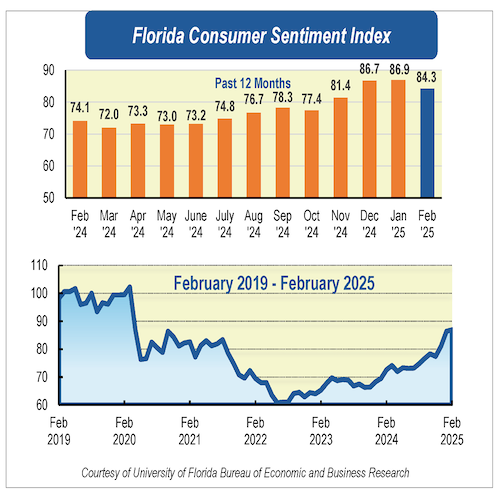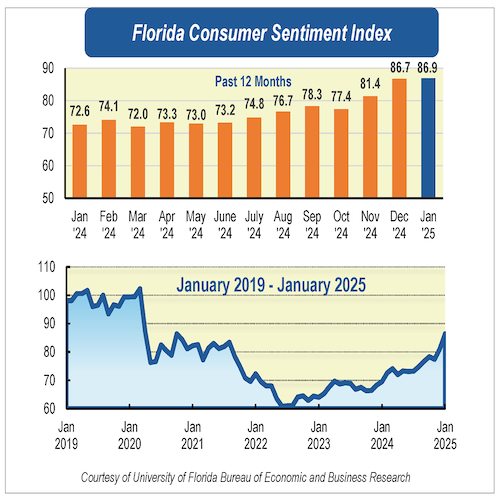Florida consumer sentiment plunges in March for second consecutive month
Consumer sentiment in Florida declined for the second month in a row, dropping 6.6 points in March to 78.1, down from a revised figure of 84.7 in February. This sharp decline is in line with the national sentiment, which fell by 7.7 points.
“The decline in sentiment was observed across all demographics, but it was particularly pronounced among Floridians with an annual income over $50,000. This pessimism stems from reduced spending intentions and concerns about future economic conditions. The last time consumer confidence dropped by more than six points was in 2020, when economic conditions worsened as the pandemic took hold,” said Hector H. Sandoval, director of the Economic Analysis Program at UF’s Bureau of Economic and Business Research.
“The decline in sentiment is not entirely unexpected, as various factors have been weighing on consumers. These include falling stock markets, which affect retirement accounts, ongoing concerns about tariffs and inflation, and government layoffs. Additionally, the Fed’s decision to keep interest rates steady, along with their updated projections for slower economic growth, has likely further undermined consumer confidence,” Sandoval added.
Each of the five components that make up the index declined in March.
Floridians’ opinions about current economic conditions portrayed a pessimistic outlook in March. Opinions of personal financial situations now compared with a year ago fell slightly nine-tenths of a point from 68.7 to 67.8. Notably, opinions on whether now is a good time to buy a major household item, such as an appliance, showed the steepest decline this month, plummeting 9.6 points from 77.9 to 68.3. These downward trends were largely shared across sociodemographic groups, except for women and people 60 and older, whose readings showed a positive change in the former component.
Likewise, Floridians’ views of future economic conditions worsened. Expectations of personal financial situations a year from now fell 7.1 points from 98.4 to 91.3. Similarly, outlooks of U.S. economic conditions over the next year dropped 7.9 points from 88.5 to 80.6. Expectations of U.S. economic conditions over the next five years also decreased, falling 7.7 points from 90.1 to 82.4. These negative views were shared by all Floridians but were particularly strong among men and people with an annual income over $50,000.
“The sharp drop in spending intentions is notable. While changes in spending intentions don’t necessarily translate into changes in actual spending, a significant decline suggests Floridians may be shifting toward more cautious economic behavior and could postpone discretionary spending, particularly on big-ticket items. This could slow economic activity, especially in retail and hospitality sectors,” said Sandoval.
“Looking ahead, the sharp decline in spending intentions, combined with pessimistic expectations about future economic conditions, suggests that Floridians are bracing for economic uncertainty. They are anticipating challenges and are likely adopting more cautious financial behaviors. We expect consumer sentiment to remain weak in the coming months as this uncertainty persists,” said Sandoval.
Conducted Feb. 1 to March 27, the UF study reflects the responses of 251 individuals who were reached on cellphones and 275 individuals reached through an online panel, a total of 526 individuals, representing a demographic cross section of Florida. The index used by UF researchers is benchmarked to 1966, which means a value of 100 represents the same level of confidence for that year. The lowest index possible is a two, the highest is 150.
Details of this month’s survey can be found at bebr.ufl.edu/florida-consumer-sentiment/.


